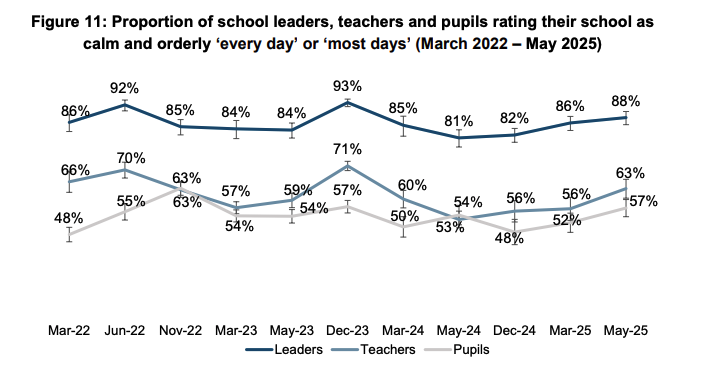Staff say their schools are now calmer and more orderly, but seven out of every 30 minutes of lesson time is still lost to poor behaviour.
The government’s national behaviour survey for 2024 to 2025, published on Thursday, also showed 88 per cent of leaders said their school was calm most days when asked in May, compared to 81 per cent in May last year.
While the corresponding figure was lower for teachers, at 63 per cent, it was still much higher than the 53 per cent record in May 2024.
Similarly, 57 per cent of year 7 to 13 pupils reported a calmer environment, compared to 54 per cent previously.
There have been similar rises for staff reporting pupil behaviour was “good”.
However, teachers reported seven minutes are still lost to misbehaviour for every 30 minutes of lesson time. This remains unchanged from the past two years.
Most parents support rules
The survey showed 84 per cent of parents were supportive of their school’s behaviour rules, similar to the 83 per cent last survey but down on 87 per cent in 2023. Parents of primary pupils were most likely to be supportive than those at secondary.
However, slightly fewer teachers felt confident in communicating with parents about their child’s behaviour – 84 per cent in February compared to 87 per cent in 2023.
But the proportion of teachers able to access training and development support for behaviour management rose from 40 per cent in 2023 to 54 per cent.

More teachers also feel effectively supported by senior leaders to manage behaviour – a rise from 48 per cent two years ago to 59 per cent this year.
But staff are still feeling the impact of poor behaviour on their mental health.
Seventy-three per cent of teachers said misbehaviour has had a negative impact on their health and wellbeing, although this is down from 78 per cent in 2024.
For leaders, 57 per cent said it impacted their wellbeing, similar to last year.
Phone ‘bans’ on the rise
In May, 53 per cent of school leaders said that pupils can bring their mobile phone to school, but must hand it in or leave it in a secure place they cannot access during the day.
This is an increase from 46 per cent in December 2023.
But primary school heads were much more likely than secondary to say their pupils must do this – 80 per cent compared to just nine per cent respectively.
Secondary heads were more likely to say pupils can their mobile phone to school, but it must be kept out of sight and not used.
However, secondary school leaders (96 per cent) and secondary teachers (88 per cent) were more likely than year 7 to 13 pupils (63 per cent) to say that pupils followed the rules on mobile phones at least some of the time.
The previous government had set out new guidance in February last year to help headteachers in prohibiting the use of mobile phones during the school day.
Secondary pupils feel more safe but less motivated
Meanwhile, the proportion of secondary pupils who said they felt safe at school in the past week was 80 per cent when asked this year – a rise from 73 per cent from 2024.
However, there was a five-percentage point drop in the proportion that felt motivated to learn, down to 70 per cent.
The proportion of secondary pupils who said they were a bullying victim in the last year dropped from 24 per cent to 21 per cent.
But 24 per cent of parents reported their child was bullied online because of a disability or special education need, up from 18 per cent last year.
Ten per cent of parents said online bullying happened because of their child’s sex, up from three per cent.
Bridget Phillipson, education secretary, has said the delayed white paper would “focus on setting early expectations on behaviour”.
She had “heard the call from the sector to do more on this” and it is about schools “having good engagement with their parents… but also expectations on parents about their responsibilities”.
Ministers have also launched 55 out of 90 new integrated behaviour and attendance hubs.
















Your thoughts